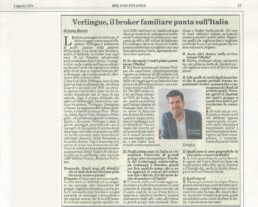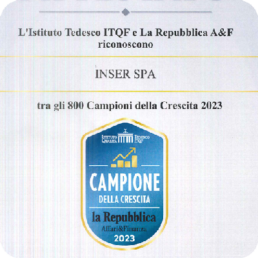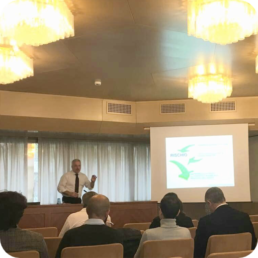Verlingue achieves accreditation as Lloyd's Broker
Verlingue achieves accreditation as Lloyd's Broker

Verlingue becomes Lloyd's Accredited Broker, opening up new opportunities for insurance coverage in the London market
Verlingue, the international broker of the Adelaide Group, of which Inser is a member, has achieved accreditation as a Lloyd's Broker, marking a crucial milestone in its strategy of growth and consolidation in the European insurance market. The accreditation, together with the launch of the new subsidiary Verlingue London Markets Europe also enables us at Inser, to strengthen our presence on an international scale, providing clients with direct access to Lloyd's, the largest insurance and reinsurance market in the world.
This recognition gives clients and partners the opportunity to access even more specialized insurance solutions, particularly in Property, Casualty, Motor Fleet and Specialist Lines. In addition, the creation of a specialized Marine division enables the company to provide coverage for all lines of marine insurance, further consolidating its expertise in this segment.
Barry Reynolds, Executive Director of Verlingue London Markets Limited, will lead this new phase of expansion. As he said, “We started this journey 7 months ago when we rebuilt, reshaped and relaunched our offering in the London market. This latest expansion is incredibly exciting and allows us to significantly extend our European capabilities for our clients and broker partners”.
Verlingue's support and relationships with international brokers played a decisive role in achieving this result as outlined by Benjamin Verlingue, Chairman of Adelaide Group: “We are delighted and honored to become an accredited Lloyd's Broker. Our ability to access the full expertise and solutions of the Lloyd's and London markets is a key part of our strategy to protect our clients wherever they operate”.
News
Inser SpA and Fondazione Lene Thun supporting Children with Cancer through Ceramic Therapy
Inser SpA and Fondazione Lene Thun supporting Children with Cancer through Ceramic Therapy

INSER and Fondazione Lene Thun join forces to bring clay-based recreational therapy to pediatric wards throughout Italy, enhancing the quality of life for young patients.
The leading Italian insurance broker Inser, part of the European family owned insurance broker Verlingue, has announced a partnership with the Fondazione Lene Thun, an organization that has been offering a permanent recreational therapy service in 33 hospitals for over a decade, providing clay modeling therapy to more than 10,000 children every year, with the support of over 600 volunteers across the country.
Inser has chosen to contribute to this project with a donation of 30,000 euros, strengthening its commitment to corporate social responsibility. This tangible support will help expand the presence of ceramic therapy not only within the Santa Chiara Hospital and the Proton Therapy Center in Trento but also in many other pediatric oncology wards across Italy. The initiative was presented on October 2, 2024, in the presence of Peter Thun, Founder of Fondazione Lene Thun, and Jacques Verlingue, Chairman of Adelaide's strategic committee, who enthusiastically emphasized the importance of supporting projects that have a positive impact on communities.
“We firmly believe in the power of creativity as a support for healing, and we are proud to contribute to a project that brings comfort and hope to so many children and families throughout Italy,” said Jacques Verlingue, highlighting the importance of the project within Inser's sustainable growth strategy. The relationship between Verlingue and the Fondazione Lene Thun is strengthened by a common historical connection to ceramics: Verlingue, shareholder of Inser, was founded by Jules Verlingue, who, before entering the insurance industry, was a partner in a majolica factory. This artistic affinity helps to strengthen the collaboration between Inser and Thun, uniting the past with a present dedicated to the well-being of children.
“We are honored that a brand whose core business focuses on the care of people and businesses has included support for the activities of the Fondazione Lene Thun in hospitals as part of its ESG sustainability plan,” said Peter Thun, Founder of the Fondazione Lene Thun. He added, “Synergies like this, characterized by strong sensitivity towards the needs and requirements of even the smallest and most fragile members of our communities, are truly significant, and I hope they can be catalysts for positive change, encouraging more companies to extend the beneficial effects of their activities far beyond corporate boundaries”.
The partnership between Inser and the Fondazione Lene Thun demonstrates how two seemingly distant entities can come together to create a positive and lasting impact. This project highlights the importance of art as a healing tool and, thanks to this contribution, will continue to bring hope and comfort to more and more children and families throughout Italy.
News
From the community, for the community: our commitment to the common good
From the community, for the community: our commitment to the common good

Inser, through its Charity Program 2023-2025, contributes to the social and sports development of the areas where it operates.
In 2015, 193 UN member countries, including Italy, adopted the 2030 Agenda for Sustainable Development, outlining 17 Sustainable Development Goals (SDGs) and 169 targets to be achieved by 2030. These goals, covering themes like poverty, gender equality, climate change, and renewable energy, are deeply interconnected. Inser has outlined an ambitious three-year investment plan aimed at supporting the communities and territories where it operates through high-value social initiatives and the promotion of sports activities. The main objectives include the continuous maintenance of social services, support for high-impact social projects, and sponsorship of various sports organizations. Currently, Inser has decided to support:
• The Caritas Diocesan Foundation of Trento;
• The Lene Thun Foundation Onlus;
• Basketball, football, volleyball, and rugby teams;
• Enactus.
Support to the Caritas Diocesan Foundation of Trento
The Caritas Diocesan Foundation of Trento stands out for its commitment to managing services aimed at promoting the welcoming and support of people in need. Every evening, at the "Mensa della Provvidenza," meals are distributed to over 100 families in need, along with medicines, sleeping bags, blankets, and food parcels. This ongoing effort is made possible thanks to over 300 volunteers, including companies, individuals, parishes, associations, and school classes, who contribute daily, providing essential support to combat poverty and help the most vulnerable groups in the population of Trento. Inser has decided to contribute to this project for the next three years, as a way to help the Foundation ensure continuous service.
Support for the Lene Thun Onlus Foundation
The Lene Thun Onlus Foundation is committed to providing permanent "recreational therapy" services through clay modeling. This type of therapy, scientifically recognized as an effective support to pharmacological treatments, is offered in the pediatric wards of hospitals, mainly in Oncohematology, Pediatrics, Pediatric Surgery, and Child Neuropsychiatry. The foundation operates in 27 facilities (20 in-person and 7 digital) and helps over 9,000 children each year. Each workshop is offered free of charge in the host hospital facilities. To make a concrete contribution to maintaining ceramic therapy workshops in the main cities where Inser operates or in surrounding areas (e.g., Trento, Milan, Bergamo, Trieste), the company has decided to support the Foundation with an annual contribution for the next three years.
Support for sports: alongside Aquila Basket Trento, Trento Calcio, and Trentino Volley, You Energy Volley Piacenza, Centurioni Rugby Lumezzane (BS)
Inser is actively committed to developing sports by supporting various sports activities in the areas where it has developed. This support for sports is not only a way to promote health and physical well-being but also to create a sense of community and identity between Inser and the places where it operates.
Objectives of the Charity Program 2023-2025
Inser Spa's Charity Program 2023-2025 represents a concrete example of how companies can significantly contribute to the sustainable development of communities. Through support for social and sports initiatives, Inser Spa demonstrates its commitment to collective well-being, promoting values of solidarity, inclusion, and social growth.
News
The public body is also subject to the obligation not to cause intolerable immissions
The public body is also subject to the obligation not to cause intolerable immissions

The caseDuring the summer period, the municipality organised cultural events in the square, which lasted until late at night.
Some residents sued the municipality to ascertain the intolerable immissions and, consequently, to obtain an order to pay damages.
On the contrary, the Municipality considered that:
- the CTU referred, for the measurements, to the 1997 Prime Minister's Decree relating to production activities and not to cultural events;
- the municipal regulations in 2004 allow, in the case of events and open-air shows, a limit of up to 70 decibels;
- the public interest in the performance of shows cannot entail the sacrifice of the private individual's right, beyond the limit of tolerability.
Instead, the Court of Cassation, in ruling no. 18676/2024, confirmed the liability of the municipality for the following reasons.
Reasons for the decision
According to the ermines, first of all, the limits set by individual regulations, including therefore the one referred to by the municipality (and approved by it) are merely indicative, since even immissions that fall within those limits may be considered intolerable. As is well known, tolerability is, in fact, to be assessed taking into account the location, the time of day, the characteristics of the area and the habits of the inhabitants.
Secondly, a public body is also subject to the obligation not to cause noisy immissions and is liable for damages resulting from the injury to the subjective rights of private persons, caused by immissions from public areas, and may consequently be ordered to pay damages, as well as the ‘doing’ necessary to reduce the said immissions to below the threshold of normal tolerability, since such claims do not concern - per se - authoritative and discretionary acts, but a material activity subject to the principle of ‘neminem laedere’ referred to above.
For further elaboration:
- Cassal Court, Judgment No. 18676/2024;
- DPCM of 1997;
- Art. 844 of the Civil Code.
News
The rotation principle: is the contracting authority obliged to exclude a contractor who has indicated the outgoing contractor as subcontractor?
The rotation principle: is the contracting authority obliged to exclude a contractor who has indicated the outgoing contractor as subcontractor?

Article 49 of Legislative Decree No. 36/2023 provides that contracts below the Community thresholds must be awarded in compliance with the principle of rotation, i.e. the prohibition of awarding the same contract to the outgoing contractor in cases of two consecutive awards.
Compared to the previous system, however, the new principle has been scaled down: previously, not only the awarding of the contract, but also the invitation to the outgoing contractor and to economic operators who had participated and had not won was prohibited; today, however, the prohibition applies only to the outgoing contractor.
The rationale is to counterbalance the contracting authority's power to identify contracting parties in sub-threshold procedures and to avoid the consolidation of situations of advantage for certain economic operators to the detriment of others who would be deprived of an opportunity to gain.
It follows that this principle does not operate in open procedures, or in substantially open procedures. In fact, paragraph 5 exempts contracting authorities if the market survey ‘was carried out without setting limits on the number of economic operators’.
However, a question remains: does the rotation principle also apply if the outgoing contractor has been indicated as subcontractor?
In the silence of the legislator, the ANAC resolution 344/2020, which considers that there is no obligation to exclude from the tender of a competitor who intends to indicate as subcontractor the economic operator that has a contract with the same contracting station, is still valid.
For further elaboration:
- Art. 49, legislative decree 36/2023;
- Art. 36, legislative decree 50/2016;
- ANAC, Guidelines, no. 4, par. 3.6;
- ANAC, Resolution no. 334/2020;
News
Digitisation of public procurement: the new ANAC guidelines of 28.06.2024
Digitisation of public procurement: the new ANAC guidelines of 28.06.2024

As of 1 January 2024, the digitisation provisions have become definitively effective and, as a consequence, the entire public contract cycle (from planning to execution) has to be managed via digital platforms: every contracting authority will have to equip itself with a digital procurement platform (so-called PAD) as a requirement to participate in the new national e-procurement ecosystem.
In order to facilitate the Administrations in adapting to the new digital systems, ANAC has made available, until 30.09.2024, the temporary web interface, ‘PCP’ (Piattaforma Contratti Pubblici), i.e. a supplementary tool to be used in the event of impossibility or difficulty in resorting to the PADs.
However, in this first phase of application, numerous difficulties were encountered by contracting stations, and by a communiqué of the President of ANAC dated 28.06.2024, the possibility of using the temporary web interface was extended - until 31 December 2024:
- for direct awards of less than EUR 5,000, but only in the event that it is impossible or difficult to use the PAD;
- for entering into framework agreements and conventions whose notices were published by 31/12/2023 with or without subsequent competitive comparison;
- for the repetition of similar works or services pursuant to Article 76, paragraph 6, of the Code provided for in the original tender documentation relating to procedures published before 31/12/2023;
- for the cases referred to in Resolution No. 584 of 2023, which replaced and integrated Resolution No. 214 of 2022.
For further elaboration:
- ANAC Communiqué of 10.01.2024;
- ANAC Communiqué of 28.06.2024;
- ANAC Decision No. 584/2023.
News
The different EU and national vision: the ban on cascading subcontracting falls down
The different EU and national vision: the ban on cascading subcontracting falls down

Both the 2004 and 2014 directives, as interpreted by the CJEU, have never provided for limits to subcontracting.
On the contrary, domestic legislation has always had a more negative view of the institute, conditioned by a legacy that views subcontracting in unfavourable terms, such as the need for strict control of the management of the contract by the contracting authority; the possibility that subcontracting could turn into a way of circumventing the rules on public evidence; and fears of possible infiltration by organised crime.
In the new procurement code, there is finally a change of course: Legislative Decree 36/2023 repealed the general ban on cascade subcontracting, i.e. the veto on the subcontracting of services already subcontracted.
It therefore stands as a pro-competitive institution, in accordance with the principles in force in the field of European Union-style tendering procedures, responding to the principle of maximum participation in tenders by companies.
On the other hand, subcontracting fulfils (or, perhaps, has always fulfilled) a function that in some respects is similar to that of outsourcing and the R.T.I., allowing, like the latter, the participation in the execution of the contract of entities that would not in themselves have the requisites or the means for the execution of the contract (and even beforehand for participation in the tender), in a competitive perspective and with the ultimate objective of expanding the number of companies potentially participating in public tenders.
For further elaboration:
Art. 105, paragraph 19, Legislative Decree 50/2016;
Art.119, Legislative Decree 36/2023.
News
Rewarding availment: from borrowing missing requirements to simply borrowing requirements
Rewarding availment: from borrowing missing requirements to simply borrowing requirements

Under the previous code (Legislative Decree No. 50 of 2016), it was not permitted to make use of so-called 'pure' recourse to 'premium' availment, i.e. that had the sole purpose of giving the auxiliary a better evaluation of the offer, without the latter needing additional requirements or resources to participate in the tender.
This regime was superseded by the new public contracts code, which formalised the admissibility of this institution, overcoming the case law that had opposed it.
In particular, Article 104 of Legislative Decree No. 36/2023 now allows for the use of outsourcing aimed not at participation, but at the exclusive attainment of the resources necessary for the attribution of incremental scores. In fact, paragraph 4, in confirming that the economic operator must enclose with the application to participate the availment contract, provides that it must specify whether it intends to avail itself of the resources of others to acquire the missing participation requirement or to improve its own offer.
The rationale is thus broader than the previous one, which was strictly linked to the possibility of participation, and also includes the exclusive purpose of having the tender acquire a better evaluation.
Thus, the factor of indispensability for the purposes of participation in the tender has disappeared, and outsourcing has become an institution that more generally concerns the loan of means (technical equipment and human and instrumental resources), also for the sole purpose of qualifying the tender in improved terms, expanding the technical, professional and financial capacity of the economic operator.
For further details:
Art. 104, paragraphs 4 and 12, legislative decree no. 36/2023;
Cons. Stato, sec. V, sent. of 9.01.2023, no. 281.
News
Violation of the duty of surveillance and maintenance is the municipality also liable in the case of an accident occurring on a neighbouring road?
Violation of the duty of surveillance and maintenance is the municipality also liable in the case of an accident occurring on a neighbouring road?

The case
A woman, in order to help her husband manoeuvre back onto the carriageway, fell into the manhole left open, sustaining serious personal injuries.
The Court of Cassation, in judgment No. 8879 of 2023, confirmed the liability of the municipality under Articles 2051 and 2043 of the Civil Code, despite the fact that the accident occurred on a privately owned road.
Grounds for the decision
According to the judges of legitimacy, in relation to neighbouring roads, the municipality is liable for their custody, provided that they are included among the roads used for public transit.
This follows from Article 2, paragraph 1, of the new Highway Code, which defines 'road' as 'an area for public use' and therefore does not depend on whether the property is publicly or privately owned; as well as from paragraph 6, which assimilates vicinal roads to municipal roads, despite the fact that the former are by definition privately owned.
Therefore - in the opinion of the Supreme Court - on the subject of liability for negligent maintenance of roads, the Public Administration is at fault if it fails to maintain or make safe the areas, including private property, bordering the public roads, when they may cause danger to road users.
It follows that in the case of damage caused by defective maintenance of a road 'the private nature of the road is not, in itself, sufficient to exclude the liability of the municipal administration where, by reason of the destination of the area and its objective conditions, it was required to maintain it'.
For further details:
Court of Cassation, judgment no. 8879 of 2023;
Highway Code, art. 2, paragraphs 1 and 6.
News
Verlingue, the family broker focuses on Italy (from "Milano Finanza")
Verlingue, the family broker focuses on Italy (from "Milano Finanza")
The latest handover took place last May, when Benjamin Verlingue took over from his father Jacques. A family story, that of Adelaïde, a broker born in the 1930s in Finistère, at the north-western tip of France. A corner of land that plunges into the Atlantic Ocean (hence the name, meaning "at the edge of the world"), where you can breathe in the essence of Brittany, which is also a point of reference for Celtic culture.Read the article published in 'Milano Finanza' here. The article was published on 03/08/2024.



































































